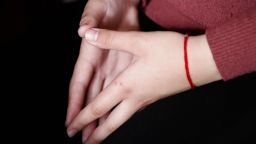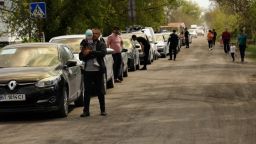The elected Ukrainian mayor of Kherson was arrested Tuesday, according to pro-Russian officials in the city, hours before the region’s Russian-backed administration announced plans for a referendum.
Ihor Kolykhaiev’s arrest comes amid growing efforts by the Russian-appointed authorities in the region to strip it of Ukrainian associations, as well as occasional assassination attempts against people collaborating with the Russians.
“I confirm that Kolykhaiev was detained by the commandant’s office,” Kateryna Gubareva, an official in the interim administration of the Kherson region, said late Tuesday.
Kolykhaiev has remained in the city throughout the occupation, but the Russian-backed authorities had removed him from office.
Speaking about his arrest, Kirill Stremousov, deputy head of the military-civilian administration of the Kherson region, said Kolykhaiev had “posed as a benefactor” but “made every effort to ensure that some people continued to believe in the return of neo-Nazism.”
Stremousov also claimed, without offering evidence, that Kolykhaiev “stole millions, and gave people a penny.”
“I believe that just retribution will come to all those who want blood, death and war,” he added.
Last week, on Russian television, Stremousov said Kolykhaiev was sabotaging work in the Kherson region.
“We even have Nazis in some areas who control administrations. What prevents [us] today from cleaning up these Nazis and accomplices of fascism?” he said.
The first word of Kolykhaiev’s detention came from his adviser, Halyna Liashevska, who posted on Facebook Tuesday that he had arrived “at one of the municipal institutions where the remaining employees of the city executive committee worked. As soon as he got out of the car, he was immediately detained by armed Russian guards.”
“They seized hard drives from computers, opened all safes, searched for documents,” added Liashevska.
“All this time, Kolykhaiev was kept in a separate room in handcuffs under armed guard. After the search, Kolykhaiev was put into bus Z and taken away.”
The letter Z is painted on many Russian vehicles in occupied parts of Ukraine.
“I am sure that the arrest of Kolykhaiev is connected with his refusal to cooperate with the occupying authorities,” Liashevska said.
“A few days ago, Kolykhaiev received a letter from the “newly appointed” mayor, inviting him to discuss the future ‘organization of interaction.’ For refusing to meet, he was threatened with arrest.”
On June 13, Kolykhaiev repeated that he and the heads of different city departments were still in the city and continued to work, after the man appointed by the Russians as regional governor – Hennadii Lahuta – said that Kolykhaiev had made the wrong choice by remaining in occupied Kherson.
Serhii Khlan, an adviser to the head of the Kherson civil military administration, told CNN that Kolykhaiev had an ambivalent relationship with the Russian occupation.
“For a while, the Russians even allowed him to sit under Ukrainian flags,” he said.
Khlan said the occupying authorities had then insisted that officials enter into contracts with the Russians and be paid in rubles.
“Kolykhaiev had a choice. Either sign the betrayal of Ukraine and finally openly work with the occupiers, or refuse to cooperate,” he said.
Kolykhaiev had continued in office for more than two months after the Russian invasion.
In April, he told Ukrainian television: “I have no information about the so called the Kherson People’s Republic. Representatives of local authorities in Kherson are at their workplaces in the city administration.”
Kolykhaiev’s arrest follows a visit on Monday to Kherson by a member of the Russian parliament, Alexandr Boroday, a former Prime Minister of the self-declared Donetsk People’s Republic.
Boroday said he had left “with an ambivalent impression, because we understand that somewhere, of course, the city is ours, and somewhere – not quite ours.”
“There is our mayor in Kherson, and there is also the pro-Ukrainian mayor,” said Boroday. “Kyiv’s mayor makes meetings, and our mayor makes meetings.
“It seems there is our administration with Vladimir Saldo [the Russian-appointed mayor], but at the same time Kherson lives a very double life,” he added.
Boroday said the city was peaceful.
“In appearance, everything is very benign, completely unlike Donetsk, Luhansk, Mariupol, Izyum – everything is much better in appearance,” he said. “But it is not entirely clear whether our power is there or not. And this needs to be done as quickly as possible.”
Within 36 hours of Boroday’s visit, the pro-Russian authorities announced plans for a referendum for the Kherson region to join the Russian Federation.
Some officials in Kherson that were previously detained have been released.
On Wednesday, an NGO called the Association of Cities of Ukraine said the heads of two communities of Kherson – Oleksandr Babych of Hola Prystan and Ivan Samoilenko of Stanislav – were released from captivity
Babych was detained on March 28, the Association said, “for his patriotic stance” and Ivan Samoilenko “was captured by the enemy on June 24.”
Ukrainian authorities said earlier this month that “more and more people [in Kherson] refuse to cooperate with the occupiers and local collaborators.”
On June 15, Ukraine’s military said that “the invaders broke into the main building of Kherson State University, captured the rector and took him away in an unknown direction.”



